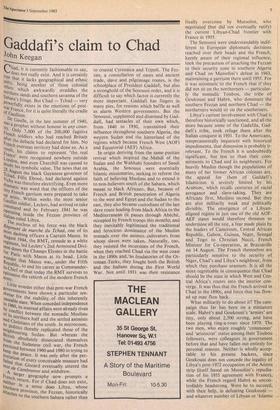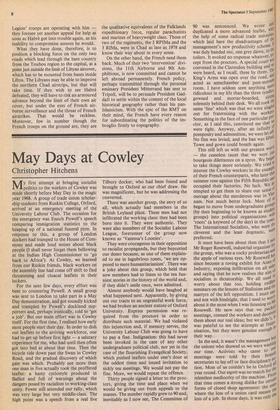Gaddafi's claim to Chad
John Keegan
Chad, it is currently fashionable to say, does not really exist. And it is certainly true that it lacks geographical and ethnic unitY, being another of those colonial relicts which awkwardly straddles the northern sands and southern savanna of the Sahara's fringe. But Chad — Tchad — very powerfully exists in the emotions of post- war France, for it is quite literally the cradle
of Gaullism.
De Gaulle, in the late summer of 1940, was a prophet without honour in any coun- rtr,.y. C.11Y 7,000 of the 200,000 fugitive French soldiers who had reached Britain after the debacle had declared for him. No result, overseas territory had done so. As a 'i-stut, his claims to represent 'the, real France' were recognised nowhere outside ,4-°rIdon, and even Churchill was caused to "2011,13t his symbolic value. The news that on f,ntigust the black Guyanese governor of v'.-"Laci, Felix Eboue, had declared against rich d, u was therefore electrifying. Even more i'rantatic was word that the officers of the nY French garrison were prepared to take arms. Within weeks the most senior Gaullist soldier, Leclerc, had arrived to take Cot/Inland and by February 1941 he was
operating inside the Fezzan province of Italian-ruled Libya.
0,,The nucleus of his force was the black rn'eiment de marche du Tchad, one of' its 4°st dashing officers a Captain Massu. In
ngust
;„_ 1944, the RMT, remade as a white srei!""_,ent, led Leclerc's 2nd Armoured Divi- for clown the Champs Elysees in the battle ,,,sr !ads with Massu at its head. Little Republic that Massu was, under the Fifth ``cPublie, to end his career as Commander- 'n Chief or that today the RMT survives to epitomise the rebirth of the modern French army.
Little wonder either that post-war French ga°vernrnents have shown a particular ten- unstable for the stability of this inherently iunstable state. When conceded independence 1;11960, its internal affairs were already riven of its between the nomadic Muslims
Its northern half and the settled animists 4:,nsd Christians of the south. In microcosm, Politics thereby replicated those of the
mBritish Sudan. But whereas the from absolutely dissociated themselves the Sudanese civil war, the French persisted between 1960 and 1980 in trying to eep the peace. It was only after the per- tatton every conceivable measure had Old that Giscard eventually uttered the 'n! de Cambronne and withdrew. larger geography now prompts a Eti_re.nch return. For if Chad does not exist, southern in a sense does Libya, whose „uthern province, the Fezzan, historically -"aches to the southern Sahara rather than
to coastal Cyrenaica and Tripoli. The Fez- zan, a constellation of oases and ancient trade, slave and pilgrimage routes, is the schoolplace of President Gaddafi, but also a stronghold of the Senoussi order, and it is difficult to say which factor is currently the more important. Gaddafi has fingers in many pies, for reasons which baffle as well as alarm Western governments. But the Senoussi, supplanted and disarmed by Gad- dafi, had tentacles of their own which, from 1840 to 1930, transmitted their influence throughout southern Algeria, the western Sudan and the hinterland of the regions which became French West (AOF) and Equatorial (AEF) Africa.
In origin deriving from the same puritan revival which inspired the Mandi of the Sudan and the Wahhabi founders of Saudi Arabia, the Senoussi were essentially Islamic missionaries, seeking to reform the faith of believing Muslims and to extend it to non-believers south of the Sahara, which meant to black Africans. But, because of French and British penetration of Algeria to the west and Egypt and the Sudan to the east, they also became custodians of the last slave route leading from black Africa to the Mediterranean (it passes through Abeche, occupied by French troops this month); and they inevitably legitimised the traditional and ferocious dominance of the Muslim nomads over the animist cultivators from whom slaves were taken. Naturally, too, they resisted the incursions of the French, when they reached Chad via the west coast in the 1890s and, 'as feudatories of the Ot- toman Turks, they fought both the British and the Italians during the First World War. Not until 1931 was their resistance finally overcome by Mussolini, who negotiated (but did not eventually ratify) the current Libyan-Chad frontier with France in 1935.
The Senoussi were understandably indif- . ferent to European diplomatic decisions reached over their heads and the French, keenly aware of their regional influence, took the precaution of attaching the Fezzan to their security zone in southern Algeria and Chad on Mussolini's defeat in 1943, maintaining a garrison there until 1955. For it was axiomatic to the French that if they did not sit on the northerners — particular- ly the nomadic Toubou, the tribe of Goukouni and Habre, who dominate the southern Fezzan and northern Chad — the northerners would sit on the southerners.
Libya's current involvement with Chad is therefore historically sanctioned, and all the more because some of the Gadafda, Gad- dafi's tribe, took refuge there after the Italian conquest in 1931. To the Americans, temperamentally impatient with historical impedimenta, that dimension is probably ir- relevant. To the French it is undoubtedly significant, but less so than their com- mitments to Chad and its neighbours. For heavily Muslim though the populations of many of her former African colonies are, the appeal for them of Gaddafi's Islamicism is severely limited by his Arabism, which recalls centuries of racial arrogance and slave-taking. They are Africans first, Muslims second. But they are also militarily weak and politically divisible. The emergence of a Libyan- aligned regime in just one of the old AOF- AEF states would therefore threaten to undermine all the rest, a fear made plain by the leaders of Cameroun, Central African Republic, Gabon, Guinea, Niger, Senegal and Togo to Christian Nucci, French Minister for Co-operation, at Brazzaville on 14 August. The French themselves are particularly sensitive to the security of Niger, Chad's and Libya's neighbour, from which they purchase uranium. It is all the more regrettable in consequence that Chad should be the state in which West and Cen- tral Africa's routes into the interior con- verge. It was thus that the French arrived in Chad in the 1890s, and force that has flow- ed up may flow back.
What militarily to do about it? The cam- paign thus far has been on a miniature scale. Habit's and Goukouni's 'armies' are tiny, only about 2,500 strong, and have been playing ring-a-roses since 1979, The two men, who enjoy roughly 'commoner' and 'aristocrat' status among their Toubou followers, were colleagues in government before that and have fallen out entirely for personal reasons. Neither is wholly accep- table to his present backers, since Goukouni does not concede the legality of Libya's post-1972 occupation of the Aozou strip (itself based on Mussolini's repudia- tion of his 1935 agreement with France), while the French regard Habre as uncon- trollably headstrong. Were he to succeed, with their help, in defeating Goukouni and whatever number of Libyan or 'Islamic Legion' troops are operating with him they foresee yet another appeal for help as soon as Habre got into trouble again, as his inability to compromise assures he would.
What they have done, therefore, is to position a blocking force on the only two roads which lead through the bare country from the Toubou region to the capital, at a point just outside the limit of Libyan aircover, which has to be mounted from bases inside Libya. The Libyans may be able to improve the northern Chad airstrips, but that will take time. If they wish to see Habre defeated, they will have to risk an armoured advance beyond the limit of their own air cover, but under the eyes of French air- borne surveillance and the threat of French airstrikes. That would be reckless. Moreover, few in number though the French troops on the ground are, they are the qualitative equivalents of the Falklands expeditionary force, regular parachutists and marines of heavyweight class. Those of two of the regiments, the 3 RPIMa and the 3 RIMa, were in Chad as late as 1978 and know their way about in every sense.
On the other hand, the French need them back. Much of their two 'intervention' divi- sions, the 11th Airborne and 9th Am- phibious, is now committed and cannot be left abroad permanently. French policy, perhaps transmitted through the personal emissary President Mitterrand has sent to Tripoli, will be to persuade President Gad- dafi to settle within the context of the local historical geography rather than his pan- Islamicism. With the epic of the RMT on their mind, the French have every reason for subordinating the politics of the im- broglio firmly to topography.



































 Previous page
Previous page